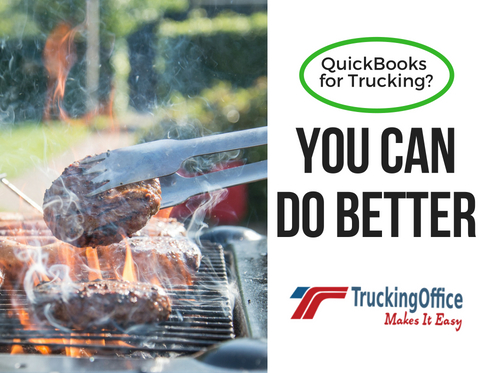Is Quickbooks for trucking the right program for the IFTA?
Think of your trucking business like a hamburger fresh off the grill. You cooked it just the way you want. The bun is waiting, the burger is still steaming and it’s time to add the ketchup and mustard to make it perfect. What are you going to use to make your trucking business perfect? Are you thinking about QuickBooks for trucking?
Using Quickbooks to track your mileage is like the bottle of ketchup that won’t pour. You shake it and pound on it and still, no ketchup on the burger.
Using Quickbooks to complete your IFTA is like the squeeze bottle of mustard. You get something out right away – it’s runny and has no flavor. It makes your bun soggy and fall apart when you try to eat.
The hamburger is still waiting.
QuickBooks for Trucking? Nope.
Here’s the problem if you’re trying to use Quickbooks for trucking. Quickbooks can’t track your mileage.
Don’t let the “mileage tracker” in Quickbooks fool you. It’s not what you need unless you’re willing to work really hard… and even then, it’s not so hot. The mileage tracker in QuickBooks isn’t for trucking, it’s for self-employed people who are going to bill someone for reimbursement. It’s not going to track your miles per state. Intuit says you can export your data and send it to your accountant, but it’s probably not the data that the accountant needs when the IFTA comes up.
The IFTA is coming up this month.
Accountants love QuickBooks. Of course they do – it’s built for them. That’s our problem – it’s not built for a trucker. Sure, the invoicing and payments are easy to use, but that’s what an accounting program is supposed to do.
Why Is There An International Tax Fuel Agreement?
If you are a trucker, you are probably familiar with the International Fuel Tax Agreement (IFTA) reports. But do you know the how or why behind them? The agreement began as a way to simplify the confusion surrounding fuel taxes for trucks traveling from state to state or to Canada. Before the agreement, each American state or Canadian province had its own fuel tax system for issuing permits and collecting taxes. This bureaucratic approach was difficult to manage and inefficient for the government and truckers alike.
IFTA changed things so that one system governs fuel taxes for all of its member states and provinces. This approach benefits all parties involved. That’s not to say that fuel tax reporting is a walk in the park – filing an IFTA report can certainly be confusing! But it is a much simpler process than it was when each state and province operated under its own set of rules and regulations. With IFTA fuel tax software from TruckingOffice, filing IFTA reports can be a breeze.
Calculating Miles for IFTA Reporting
Having an IFTA sticker on your vehicles means you have the freedom to travel through all IFTA jurisdictions while only submitting one quarterly fuel tax return with your base jurisdiction. But, there are certain IFTA requirements that go along with the fuel tax agreement. For one, you have to calculate and report the miles your vehicles travel in each state. You also have to record the total gallons of fuel purchased and the amount of fuel consumed for each state. If your IFTA reporting isn’t up to par, you could be in for some hefty fines or possibly even have your trucking company shut down. If you make a mistake and overpay your obligations, you can forget about getting that money back. If you underpay, you could face an IFTA audit.
Investing in trucking management software specifically designed for trucking companies is worth the peace of mind you’ll gain by staying up to date on federal IFTA requirements and having your IFTA fuel tax records completely under control. Our IFTA reporting software uses PC*Miler to automatically calculate your miles, so you don’t ever have to put pencil to paper and try to figure out your miles manually, running the risk of making a mistake on your IFTA report. The software also sorts and reports mileage and fuel gallons per state, so you can rest easy knowing that your IFTA report is accurate every time.
What’s better?
If you still think about your trucking business as a hamburger…
There are several separate parts of the perfect hamburger. You love the ketchup and mustard. I’m partial to the tomato and lettuce and dill pickles. Each of those items can represent the different parts you have to manage.
- Invoices
- Accounts payable – especially the late pays
- Expenses
- IFTA
- Maintenance records and scheduling
- IRP
- HVUT
- Load planning
- Routing
- Driver records
- ELD
If your’e trying to use QuickBooks to manage your trucking business, it will handle exactly the first three of those things well. It will do a fine job of cutting the checks for the IFTA and IRP – after you figure them out. You can preschedule the HVUT payment, I guess, but there’s no way QuickBooks is going to plan your loads or your routes.
If you’re going to pay for a software to help you run your trucking business, either as an owner-operator or a fleet manager, you need a full trucking management solution.
Having this accounting program trying to connect to that routing program and another tracking your equipment maintenance? It’s asking for trouble – and triple the work.
Quickbooks for trucking? You can do better.
TruckingOffice TMS will take the information for your invoice from the moment you enter it into the computer and do more than QuickBooks ever thought about doing. IFTA, IRP, driver records, maintenance, we’ve got it all. And if you want to, you can export the billing details to a file for your accountant.







Recent Comments